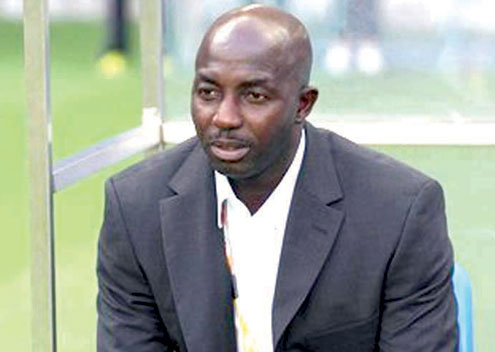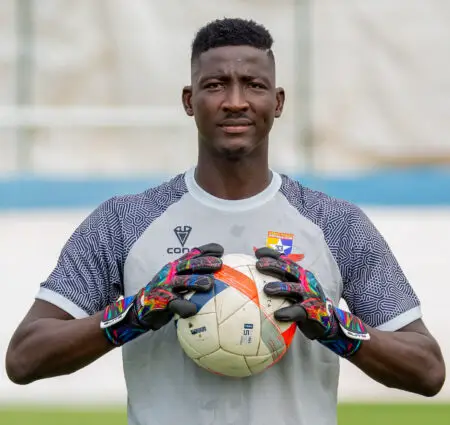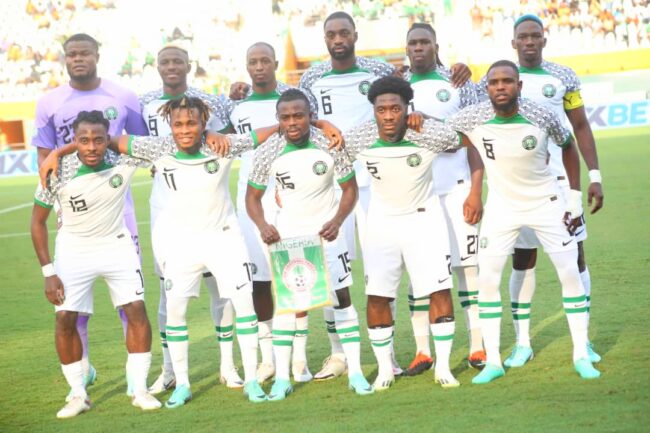Historically, international sporting federations have claimed immunity on a variety of legal principles, but within the Anglo-American tradition, principally so on the basis that they were private organizations and, as such, beyond the law’s purview. As athletes become more professionalized and sport become more commercialized, this notion of sport as an activity governed by a private club unaccountable to anyone for their far-reaching decisions become more and more untenable.[i] Thus, during the 1990s, there were a series of challenges before national courts by athletes who had been banned from competition by their international federation for drug offences. These were broadly based on the argument that their livelihood was threatened or even destroyed by arbitrary, and often secret, decision making by international sporting federations and their agencies.
Football fans from Nigeria wait with bated breaths for the beginning of the hearing of the appeal lodged by ex-Super Eagles of Nigeria forward and gaffer, Samson Siasia against the decision of the FIFA Ethics committee delivered on August 16th, 2019 imposing a life ban on the ex -Nigerian Olympic Silver-medal winning coach. The hearing, which was re-scheduled to February 3, 2021, would have to wait for another date following two consecutive postponements due to the rampaging COVID-19 pandemic. Given the dearth of any readily available precedent on the severity of the punishment meted out to Mr. Siasia, many football commentators have wondered why certain factors were not taken into account by the FIFA Ethics Committee. While there have been a few cases where a life ban was imposed and upheld for violation of FIFA’s Code of Ethics, most of these cases were firmly decided on their peculiar facts. This article analyses the daunting task before the panel of the Court of Arbitration for sports before whom the appeal is currently pending and makes a case for a review of the decision on the proportional penalty principle. Put differently, the author takes the view that given the peculiar facts and antecedents of the coach, the penalty of a life ban imposed on Coach Siasia, is disproportional to the offence. By FIFA’s statement, Siasia breached Article 11 of the FIFA Code of Ethics 2009 revolving around bribery of an official.
The jurisdiction of CAS is defined in article 58 of the FIFA Statutes, whereby appeals against final decisions passed by FIFA’s legal bodies and against decisions passed by confederations, member associations, or leagues must be lodged with CAS within 21 days of notification of the decision in question.
It is clear that a number of penalties delivered by domestic tribunals for sports corruption have been severe often excluding the athlete or coach from the sport for life. Although the fact that a penalty might appear to be disproportionate does not justify a court interfering with it[ii] and that judicial sympathy must not be elevated into a principle of law[iii] doubts have been expressed as to the validity of a sanction that would appear disproportionate to the athlete’s wrong.
Two cases decided by the CAS highlight the application of this principle of proportionality. In both cases, the argument on proportionality succeeded in part with the CAS setting aside and/or reducing the length of sanction issued to the athlete. The issue arose in the case of Kevin Sammut v UEFA[iv] – where a Maltese International footballer appealed to the CAS to reduce a life ban for match-fixing following a four to Nil loss by Malta to Norway in the UEFA European Football Championships game. From the available evidence, Sammut had met, on behalf of himself and other players, a gambler Marijo Cyrtak (In Cyrtak’s hotel room in Oslo), who later placed a 100, 000 Euros bet that Norway would win their game by 4 goals. Cyrtak won 340, 000 Euros of which 70, 000 Euros were distributed to the players concerned. Cyrtak who was later arrested by the German Police implicated Sammut. Among the many arguments canvassed on appeal was that the penalty was disproportionate and excessive, if compared with similar cases in national and international football. Sammut had argued that he came from a relatively ‘small’ football Federation and referenced corruption cases in Italy and Finland where much less severe penalties were given. Sammut further argued that apart from the isolated incident of match-fixing for which he was penalized, he has no criminal antecedents whatsoever. UEFA, in responding to this submission, referenced Sammut’s error on the pitch which led to Norway’s first goal. Ruling on this point, the CAS took the view that Mr. Sammut’s error on the pitch which led to the first goal does not by itself prove his intention to allow the goal. At least, in theory, Mr. Sammut could have simply been a messenger between the unknown players who conspired to implement the fix and the persons who were willing to provide money for it. Nonetheless, meeting in the hotel room of the gambler, Cyrtak, prior to the match in question was sufficient evidence to invoke the wrong of ‘engage in or attempts to engage in active or passive bribery and/or corruption’. In respect of the proportionality of the penalty, the CAS panel found for Sammut under these circumstances, the panel finds that despite the seriousness of a match-fixing offence and the Appellant’s involvement, in this case, a lifetime ban is disproportionate given the proven role played by Mr. Sammut in the fix. His career as a football player has ended as a result of the episode that gave rise to these proceedings and the panel finds that a 10-year ban from any football-related activity is commensurate to Mr. Sammut’s infraction of the Rules. Accordingly, Sammut’s appeal succeeded in part.
The second case is the case of Savic v Professional Tennis Integrity Officers[v] where the athlete was found guilty of corruption by the Anti-Corruption Hearing Officer (AHO) of the Uniform Tennis Anti-Corruption Program (UTAP). This determination was partially overturned on appeal to CAS on the grounds that it was disproportionate to the offence. Savic had contacted another professional tennis player known as ‘Mr. X’ in his hotel room in Beijing by phone and then Skype offering to pay him US$30, 000 should he agree to lose the first set of his first-round tennis match though he was free to win his second and third sets. Mr. X reported the offer to officials of the Tennis Integrity Unit. Two weeks later, X received a text message which read “I have the same question for you like 2 weeks ago…did you change your mind?” David.
Savic was charged with the offence of ‘directly or indirectly attempting to contrive the outcome of an event’. The AHO found Savic guilty, fined him $100, 000 and imposed a lifetime period of ineligibility. Savic appealed to the CAS on the ground that the mobile phone messages were the result of ‘spoofing’- a message sent by a third party using another’s name, their mobile phone number, or Skype details. Savic argued that given the severe consequences of guilt upon his career, the AHO in making his decision applied the wrong standard of proof. Savic further appealed on the grounds that the penalty was disproportionate to the offence. The CAS stated that in respect to a $100, 000 fine and a lifetime ban, the offence must always reflect the extent of the athlete’s guilt. The CAS panel in lifting the fine sought to balance the consequences of the offence to the sport of tennis with the need to protect it from those consequences. The panel stated as follows:
“the prevention of corruption is a compelling interest to balance against the Appellant’s right to work….the panel concludes that sanction of a life ban imposed by the AHO decision does not violate public policy and is not disproportionate given the nature of the offences committed“[vi]
Thus, the panel while upholding the lifetime ban, set aside the fine imposed on Savic thereby ensuring that the appeal succeeded in part.
Back to the realm of football, another case of notable importance is the case of Oleg Oriekhov v UEFA[vii] where Mr. Oriekhov was indicted for fraud bothering on match-fixing and illegal gambling following the interception of some telephone conversations involving other suspects. Mr. Oriekhov was eventually found guilty by the UEFA Control and Disciplinary body and a request was made to FIFA to give the ban a worldwide effect. Mr. Oriekhov appealed to CAS seeking to overturn his ban. On appeal, the CAS considered it unnecessary to make a finding on whether the Appellant was guilty of manipulating the match or receiving money. The CAS took the view that the Appellant’s repeated and undisclosed contact with the criminals was sufficient to ground his conviction. The argument on proportionality failed.
While it is evident that the argument on proportionality has only succeeded in a few cases, much depends on the peculiar facts of each case. It is also clear that in the few cases where the argument on proportionality succeeded, a number of factors such as the criminal antecedents or record of the athlete, as well as the level of involvement were considered. This is most evident in the Sammut case where the panel went as far as considering the long-term effects of the player’s burgeoning playing career and reduced the lifetime ban. The period these decisions were reached, most of which were delivered between 2009-2014, shows a striking uniformity in approach by the panel and an unconscious build-up of a body of ‘precedent’. While lauding the overriding judicial objective to stamp out corruption in the game, it is important that equity and fairness are not thrown overboard.
Admittedly, the bandied ‘autonomy’ of sports has often resulted in some of the Tribunals departing from some seemingly inflexible principles of the law sometimes to the detriment of the rules of natural justice. The sporting Federations approach the CAS seeking favourable interpretations of the statutes and guilt-trip the panel into thinking that a liberal interpretation of their statutes and rules is the only means of confirmation of sporting autonomy. This argument has become more popular before the National courts when the latter is approached to review some sporting decisions. The CAS must resist the temptation of keenly considering this argument. It is the author’s considered view that sport is no different from any other sphere of life, especially when it involves commercial and business interests. Accordingly, there is no justification for the law to stop at the touchline. [viii] Secondly, even if it is conceded that sport is a special field, it should be granted a relative autonomy from legal intervention as a sphere organized by private entities that can be trusted to govern its affairs, so long as basic conditions of due process and fairness are observed. The prevailing consciousness of sports as an autonomous activity has been reflected in some of the appeals from the adjudicative bodies of some sports federations with CAS seemingly reluctant to overturn some of the sanctions. Overturning or reducing the sanctions is often looked upon as a failure in furthering the convenient theory of deterrence and weakening the sports federations. The panel should be mindful of this effective legal antic by the representatives of FIFA.
The task before the CAS panel hearing Mr. Siasia’s case is very simple; to look beyond the circumstantial evidence in doing justice. In doing so, regard must be had to previous decisions in similar cases even though CAS jurisprudence does not support the application of the principle of stare decisis in the real sense. The sobering damage to his managerial career must be considered just like his antecedents as a professional footballer who was not involved in any illegal or corrupt activity. The panel must resist the temptation of making a blanket application of the Code of Ethics to ‘make an example’ or to ‘serve as a deterrent’ to others. Upholding the fine and the lifetime ban would not only set a bad precedent but would give credence to the long-held suspicion that there is a dichotomy in the standards applied in trying corruption cases in sports. How the panel can navigate this ‘slippery slope’ would undoubtedly either enrich our sports jurisprudence or send judicial shock waves to Africa and the 3rd world countries.
End Notes
[1] Foster, K. 2019. Global Sports Law Revisited. Entertainment and Sports Law Journal, 17: 4, pp. 1–14. DOI: https://doi.org/10.16997/eslj.228
[1] See Rush v Western Australia Amateur Football League Inc (2005) WASC 206, (198)
[1] Faramus v Film Artists Association (1963) 2 QB 527
[1] CAS 2013/A/3062 -180
[1] CAS 2011/A/2621
[1] Ibid at Para 8.34
[1] CAS 2010/A/2172
[1]Ibid
By: Steve Austine Nwabueze






1 Comment
In lieu of the conclusion of the writer as well as the cases cited in this article therein, it behooves an enormous but important task on Siasia’s defence counsel to prove that there was and has never been any contacts whatsoever, either in person or by proxy, between Mr Siasia or a representative, ab initio, with the said Mr Perumal, for a total overrule of the verdict of the FIFA ethics committee.
From precedence, we may have to set our hearts to a reduction, in the spirit of application of the principle of proportionality. However, an outright overturn will be highly heartwarming. We await with bathed breath the eventual outcomes, even as we wish Mr Sia1 the best of luck. But what must be avoided at this time is the sense of appeal to pity and prejudice….the law seldom works in favour of those.